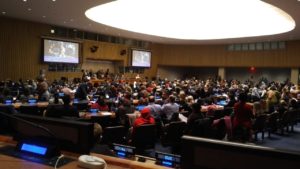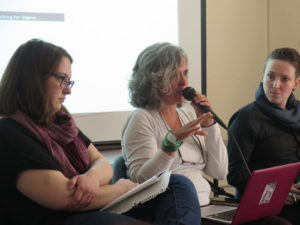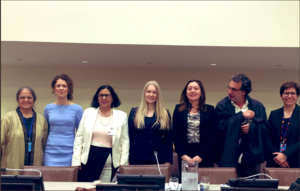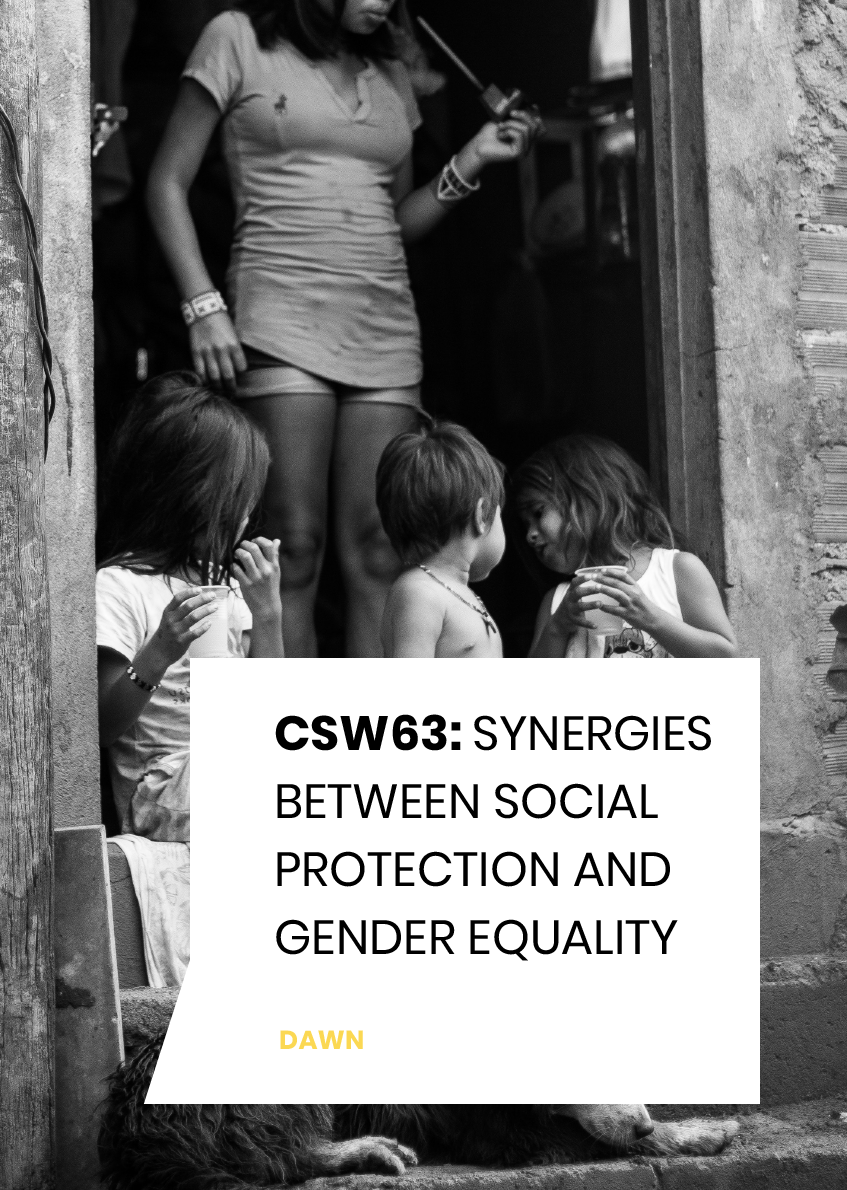
On March 22nd, 2019, the 63rd session of the Commission on the Status of Women (CSW) concluded its work underlining the importance of not reversing the levels of protection achieved in regard to women’s and girls’ access to social protection, public services and sustainable infrastructure; particularly in the areas of health and education. In the Agreed Conclusions document, the commission recognized that progress could be undermined by budget cuts and austerity measures.
The Agreed conclusions also stated that public services and infrastructure must improve, in order to enhance the safety of women and girls, emphasizing that social protection systems, public services and sustainable infrastructure are interlinked and mutually reinforcing and stressed the need for coordinated approaches.
The recognition of unpaid care and domestic work as a constraint to women’s economic, political and social participation, as well as access to education and working opportunities, are also included in the document. The commission urged governments to ensure women’s full and equal participation and universal access to social protection, to take all appropriate measures to recognize, reduce and redistribute women’s and girls’ disproportionate share of unpaid care and domestic work and to ensure access to social protection for unpaid caregivers of all ages.
Poverty, working conditions, climate change and violence against women and girls were also addressed in the agreed conclusions document.
Feminist organizations highlighted the gains achieved, in spite of the increasingly polarized political environment at CSW63. They stressed that governments, for the first time in CSW, recognised the right to social security and the diverse gendered impacts of sustainable infrastructure. However, they failed to question macroeconomic policies of deregulation, trade liberalisation, austerity and privatisation of public goods and services, that lead to inequality and that have a disproportionate impact on women. There were little committment to public funding and public provisioning of social protection and instead there were multiple explicit references to the private sector, despite the evidence showing the disastrous and disproportionate impact of privatised services on women. Governments failed to regulate and hold the private sector accountable for its responsibility to uphold women’s human rights.
Although the Agreed Conclusions mention International Labour Organization (ILO) conventions and the decent work agenda, there are no state commitments to reverse policies of labour deregulation that are at the root of labour market inequalities, and gender segregation of labour. Member States also failed to commit to integrating sexual orientation, gender identity and expression, into the design of social protection, public services and infrastructure systems.
Read the full press statement of the Women’s Rights Caucus on CSW63 agreed conclusions
DAWN at CSW63
Care work, corporate power and taxing for gender justice were the main topics addressed by DAWN at CSW63. At various side and parallel events, DAWN shared its analysis and reflections on the current situation of social protection and its impact on women and girls in the world and in Latin America in particular.
DAWN was invited to the NGO CSW 63 Forum Consultation Day, where Executive Committee member, Corina Rodríguez, made references to some features that social protection systems in Latin America have in common, highlighting the progress in many countries (mostly in South America) in terms of the consolidation of a human rights approach to social protection; the renewed legitimacy of State interventions and increasing public spending; and the extension of coverage of social benefits. However, she also addressed the persistent limitations, that are expected to increase given the current wave of neoliberal governments: still high level of poverty and inequality, insufficient level of cash benefits and fiscal constraints, due to the resistance to approach progressive tax reforms and handle the whole issue of illicit financial flows that restrict financial sustainability and reduce the policy spaces.

Similarly, at the parallel event “Women’s Social Protection in LAC- a view from Civil Society”, Corina presented some proposals from the regional consultation preceding CSW, that coincided with some of the agreed conclusions, in relation to taking affirmative action to reduce inequalities in education and employment, to acknowledge care work and to design public policies to reorganize care work, amongst many other conclusions.
Along with the governments of Uruguay and Cuba and with UN Women and FEMNET, DAWN organized the side event “Care systems and social protection models: impacts on women’s rights and women’s autonomy”. Speakers from the panel highlighted the inequality of the current social organization of care in most countries, not only between women and men, but also amongst households, the State, the market and the community. Therefore, approaching care issues is essential to dismantle a central mechanism for the reproduction of gender and socio-economic inequalities. For this, it is key to push an agenda for the reorganization of care with a feminist perspective, with comprehensive public systems of care as a central element, based on human rights and solidarity and with institutional and financial sustainability. The case of the National Care System in Uruguay was presented as a leading case from the region.
Corporate capture and tax reforms

Feminism, and feminist economics in particular, points at the crisis as a systemic characteristic of capitalism. International Financial Institutions (IFIs) and mainstream neoliberal governments, instead, promote the need of austerity and privatization as solutions to economic crisis, noted Corina Rodríguez at the event “Reclaiming public policies for gender justice: an intergenerational feminist dialogue”. Feminist economics highlights the fact that states can no longer guarantee public interest, because they have been subjected to corporate capture. Public-Private Partnerships are an expression of this corporate capture that has gained much relevance in areas that are key for girls and women: social infrastructure and social provisioning.
DAWN highlighted that there is no way of building social protection floors without taking into account how to secure financing. This was one of the main messages put forward, along with the Global Alliance for Tax Justice, at the parallel event “Shifting the Narrative: Financing Women’s Rights through Tax Justice” and “Taxing for Gender Equality: Evaluating Gender Effects of Tax Laws”. We need to think and promote progressive tax system reforms, international tax cooperation and addressing the whole issue of illicit financial flows.
Read about the launch of the Feminist Alliance for Trade Justice
Universal Health Coverage

On March 15th, during the priority theme interactive expert panel, organized by UN Women, DAWN General Co Cordinator, Gita Sen made a presentation based on her CSW background paper “Universal Health Coverage, Gender Equality and Social Protection: a Health Systems Approach”.
She highlighted the interconnections and needed synergies between policies to move towards universal health coverage as a key element of social protection. While policies to advance gender equality, women’s empowerment and human rights have seen advances in recent years, the recognition of UHC hasn’t been matched with adequate financing and by ensuring access to all women and girls, as well as to groups who are vulnerable to exclusion, marginalization and discrimination.
UHC systems need to have a women’s and girl’s human rights perspective that not only puts the spotlight on the needs and rights, but that also address intersected power relations and oppressions.
In line with the agreed conclusions, the panel emphasized the importance of universal health coverage that comprises universal and equitable access to gender responsive, quality health services. It stresses the importance of strengthening health systems in terms of availability, accessibility, acceptability and quality in order to better respond to the needs of all women and girls.
Turning the Tide on HIV, ensuring SRHR for all by 2030

DAWN’s Gita Sen was also a speaker on the side event panel “Step It Up! Most Left Behind Adolescent Girls – Turning the Tide on HIV, ensuring SRHR for all by 2030”. This dialogue among experts from young people’s movements, decision-makers from government, the UN, donors, academia and civil society, focused on adolescent girls —living in poverty, with HIV, with disabilities, survivors of gender-based violence, migrants, sex workers, LGBTQI, those who use drugs, domestic workers, young widows, among others— who remain largely invisible in policies, services and investments.
“The 2030 agenda mentions adolescents…once!”, regretted Gita Sen, making the point of how we need to learn new ways of doing things—with young women´s voices, participation and leadership at the forefront. It has taken us far too long to recognize the growing incidence of HIV among adolescents girls, for which we need to push, accelerate and ‘step it up’ the appropriate interventions to securing that adolescent girls’ SRHR are guarantee. Gita also mentioned 4 elements to push this forward: recognition of adolescents in all of their diversity, and affirmation of their rights; removal of barrier to access health services, including legal barriers; provision of financing and service; and the space for self affirmation and assertion of rights.

